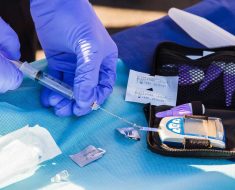The coronavirus could affect a person and they may not know they have the infection but still be able to spread it. A new coronavirus that has spread to more than 2,000 people is infectious in its incubation period before symptoms show making it harder to contain, Chinese officials say. With the virus becoming a major concern for many, Dr Hilary discusses the latest on the virus this morning with Lorraine Kelly on her self-titled show Lorraine.
READ MORE
-
 Best supplements for muscle gain: This acid helps build muscle
Best supplements for muscle gain: This acid helps build muscle
Dr Hilary spoke on This Morning with Loraine and said: “In the UK we have tested over 50 people and all those tests have been negative.
“It is very likely that we will see some cases here because 2,000 people have already flown in from Wuhan in the last few weeks and we don’t know whether they are affected.”

Lorraine asked Dr Hilary whether we should be concerned about the coronavirus, who replied: “We have flu every winter.
“To some degree we have some people affected by the flu and flu kills people every year.
“On average it kills around 4,000 people in the UK every year but most of those people are elderly.
“They have preexisting heart or lung conditions which makes them very vulnerable. Their immunity is very low and they are already very weak.
“Now the difference between this type of coronavirus flu like infection and normal flu is that it seems to be more virulent.
“You’ve got 81 deaths already in China. We need to know whether those are young and fit people or whether they are mainly older.
“I’ve been told they are mainly elderly and for them in the over 60 year old age group the mortality is quite high.
“So we need to be concerned but certainly not panicking.”

READ MORE
-
 Best supplements for eczema: Herb to relieve condition
Best supplements for eczema: Herb to relieve condition
What is the virus?
The virus itself is a new coronavirus, a family that normally affects animals.
One human variant causes the common cold, but another, SARS, killed hundreds in a major outbreak in 2003.
This new virus causes severe acute respiratory infection.
Symptoms seem to start with a fever, followed by a dry cough and then, after a week, leads to shortness of breath and some patients needing hospital treatment.
There is no specific cure or vaccine.

Dr Hilary advised washing your hands frequently to avoid catching the virus.
Other preventive measures include avoiding touching the eyes, nose and mouth with unwashed hands, avoid close contact with people who are sick, stay home when you are sick and cover your cough or sneeze with a tissue, then throw the tissue in the trash.
Chinese health authorities reported a group of cases of viral pneumonia to the World Health Organisation (WHO) in late December 2019.
Many of the ill people had contact with a seafood and animal market in Wuhan, a large city in eastern China, though it has since become clear that the virus can spread from person to person.
Source: Read Full Article





